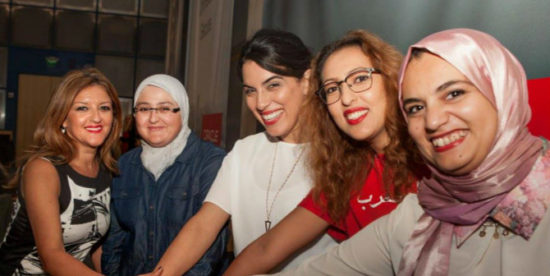By Jennifer Clinton, PhD, President, Global Ties U.S.

Exchange program participants at an event.
Two important events happened in the month of March: the famous annual NCAA basketball tournament and the release of the President’s first budget.
The Trump Administration published its “skinny” budget blueprint on March 16 outlining plans for defense and non-defense discretionary spending. The budget calls for a $54 billion increase in defense spending – a full repeal of the spending caps often referred to as “sequester.” To offset these costs, the budget reduces non-defense discretionary spending by about one-tenth. Relative to today’s level, the budget would cut the State Department by 29 percent ($11 billion), the Environmental Protection Agency by 31 percent ($3 billion), the Health and Human Services Department by 16 percent ($13 billion), and the Education Department by 14 percent ($9 billion). Most other domestic agencies would also see substantial cuts; 19 smaller agencies would be eliminated entirely.
The NCAA tournament had a top-seed winner in North Carolina, but this year’s tournament saw a #7 and #3 seed make it to the Final Four, and quite a few bracket-busters with the early elimination of favorites Duke and Villanova.
I grew up playing basketball so the NCAA tournament is near and dear to my heart. Like millions of Americans, I look forward to the tournament each year, and look back fondly at my own playing days. Early in my career I was widely recognized as a great defender; I was tenacious and stuck to my opponents like glue. People were intimidated when they knew I was to guard them. As I progressed through high school, I quickly learned that although defense was important, alone it just can’t win games. You actually have to score points. And to do this, you have to shoot—and miss—a lot. I recognized that my one-dimensional game was not sustainable, and made worked tirelessly at my offensive game to increase my versatility and skills as a player. This required fundamental change and a lot of hard work, but it paid off when I earned a full scholarship to play Division I basketball.
What does this have to do with the President’s budget? The proposed massive cuts to the State Department signal that we are changing our game and our role in the world from a more balanced game to a singular focus: defense. According to Ambassador Barbara Stephenson, President of the American Foreign Service Association, our diplomats on the frontlines play a major offensive role “in opening markets for U.S. goods, assisting Americans abroad, negotiating agreements in line with U.S. goals, reporting on threats to the U.S. homeland, and work alongside our military colleagues on a range of missions, from stabilizing Iraq to earthquake relief in Haiti.”
International exchange programs, particularly the IVLP, are one of the most important offensive “plays” the U.S. has at its disposal. America knows and loves its sports, and intuitively gets that you don’t win national championships by benching your top scorers–which is why so many top leaders across the government, including dozens of Republicans, are making it clear that America cannot retreat from its offensive game – diplomacy. Secretary of Defense General James Mattis, Senator Lindsey Graham (R-S.C.), Senate Majority Leader Mitch McConnell (R-KY), Senator Marco Rubio (R-FL), Rep. Mac Thornberry (R-TX), Chairman of the House Armed Services Committee, and Rep. Ed Royce (R-CA), Chairman of the House Foreign Affairs Committee, have all asserted that pulling back on our investment in diplomacy is pulling back on America’s leadership in the world.
These messages are reinforced by the nine in 10 Americans who support strong U.S. global leadership, which requires strong diplomacy and a broad and robust playbook which includes international exchange programs. Throughout our Network, so many are stepping forward to remind and engage Americans that we need a strong offensive game to complement our defense. Such a strategy is necessary to win “the long game.”
Earlier this month, Ambassador Barbara Stephenson and I gathered our respective local networks in Florida to discuss ways in which the Foreign Service community in FL and Global Ties members and volunteers can work together to amplify each other’s’ messages on the impact diplomatic activities–including the IVLP–has in the state of Florida. On any given day, there are more people visiting Florida than live in 13 U.S. states and those visitors will, on average, spend $224 million every day. International trade comprises 17 percent of Florida’s economy, and FL ranks sixth among all U.S. states in employment by majority foreign-owned firms. It’s clear that Florida is incredibly dependent upon America playing offense around the world, and it is just one of many examples.
The American Gaming Association estimated that Americans would wager approximately $10.4 Billion on March Madness, a series of games with no guarantee of winning that are, ultimately, a game, with only pride and money at stake. When you weigh this against the investment in foreign affairs and diplomacy, with such a clear connection between investment and long-term benefit and return, the choice looks obvious. Let’s continue to work together to play the long game, smartly, strategically, loudly, and clearly.
